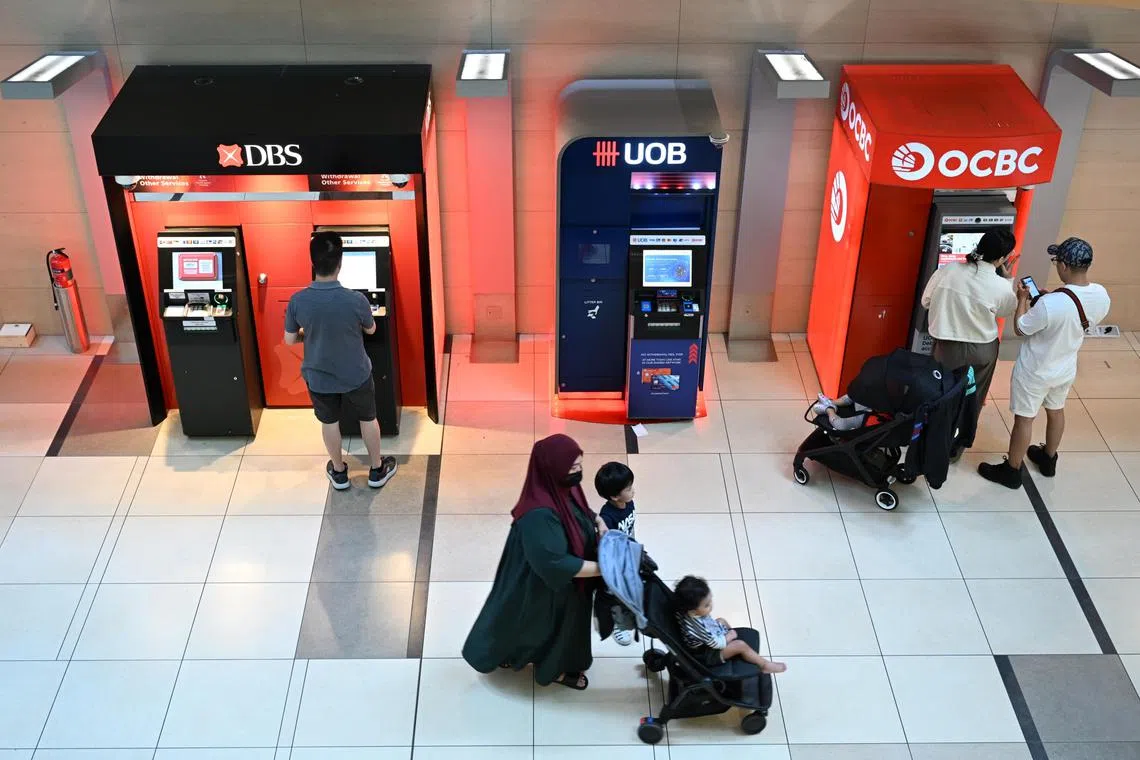Shares of S’pore’s three banks hit record highs after another quarter of strong profits
Sign up now: Get ST's newsletters delivered to your inbox

DBS, UOB and OCBC announced another quarter of strong profits, buoyed by higher fee income from wealth management and trading.
PHOTO: ST FILE
Follow topic:
SINGAPORE - Shares of DBS, UOB and OCBC hit record highs on Nov 8, after the three local banks separately discussed options to manage excess capital, including share buybacks and increased dividend payouts.
UOB gained the most, rising 7.2 per cent to close at $35.69, after chief executive officer Wee Ee Cheong said at the bank’s results briefing on Nov 8 that it is open to considering a share buyback, among other options, to manage excess capital.
UOB has excess capital of about $2 billion to $2.5 billion.
This came after DBS announced at its Nov 7 briefing that it will buy back $3 billion worth of shares in the open market and cancel them in the next few years, in a bid to lower excess capital and raise earnings per share.
DBS rose 1.7 per cent to close at $42.40 on Nov 8.
OCBC bucked the trend, with CEO Helen Wong noting that the bank prefers to give dividends over share buybacks to return excess capital to shareholders.
OCBC finished trading 1.1 per cent higher at $16.06.
The three banks on Nov 7 and 8 announced another quarter of strong profits, buoyed by higher fee income from wealth management and trading, even as interest income softened amid an outlook of volatile rates.
DBS’ third-quarter net profit rose 17 per cent to $3.03 billion, jumped 16 per cent to a record $1.61 billion rose 9 per cent to $1.97 billion,
DBS declared an interim dividend of 54 cents per share for the quarter, unchanged from the previous quarter. UOB and OCBC pay out dividends semi-annually.
Looking ahead, DBS and UOB said interest rates could remain high as US President-elect Donald Trump’s policies kick in, which could further support their businesses in the year ahead.
Some of Trump’s proposed policies for 2025, such as higher trade tariffs and potential tax cuts for businesses, are expected to be inflationary in nature.
This could complicate the US Federal Reserve’s guidance of cutting interest rates in 2025, as higher inflation could lead them to reconsider or delay rate cuts in order to prevent the economy from overheating.
For now though, all three are expecting continued rate cuts.
They remarked that it is still too early to definitively tell what effect the Trump presidency will have on inflation, or what the Fed will do.
“On the face of it, yes, the interest rate may stay at a higher level for longer, based on the strict policies and inflation, but I don’t want to make that assumption,” said Mr Wee.
Still, UOB’s portfolio was adjusted to reduce the bank’s sensitivity to interest rate movements, in anticipation of rate volatility ahead, said the bank’s chief financial officer Lee Wai Fai.
OCBC is basing its plans on expectations of further rate cuts.
The bank is focusing on increasing its base of low-cost deposits to cushion its net interest margin from the impact of potentially falling interest rates.
It expects 2025 profits to remain stable compared with 2024 even if cuts occur, as it sees non-interest income growing by double digits next year, said Ms Wong.
DBS is also prepared for further cuts in 2025, although CEO Piyush Gupta expressed confidence that the bank can maintain its 2024 net interest income level in 2025.
He noted that the bank has been adjusting its strategy for potential cuts to be able to weather lower rates, should they occur.
“The market is now obviously pricing in (fewer) cuts, which might have some bearing on our assessment for next year,” he said.
Even if rates were to be higher, it would be a boon for the bank, as they boost interest income and hence its net interest margin, he added.

